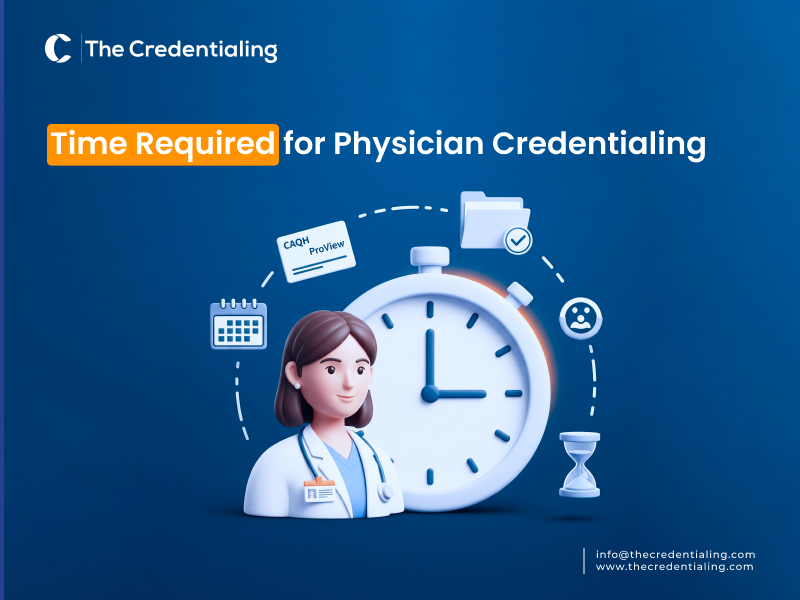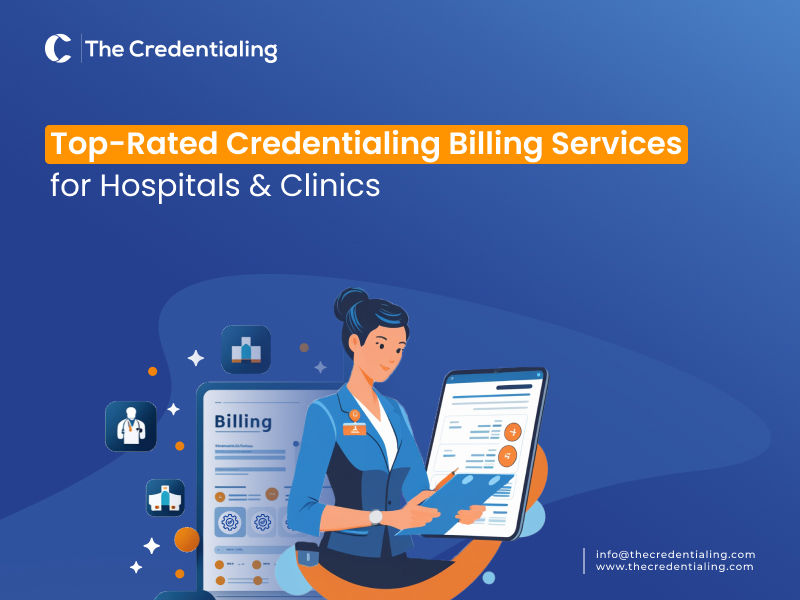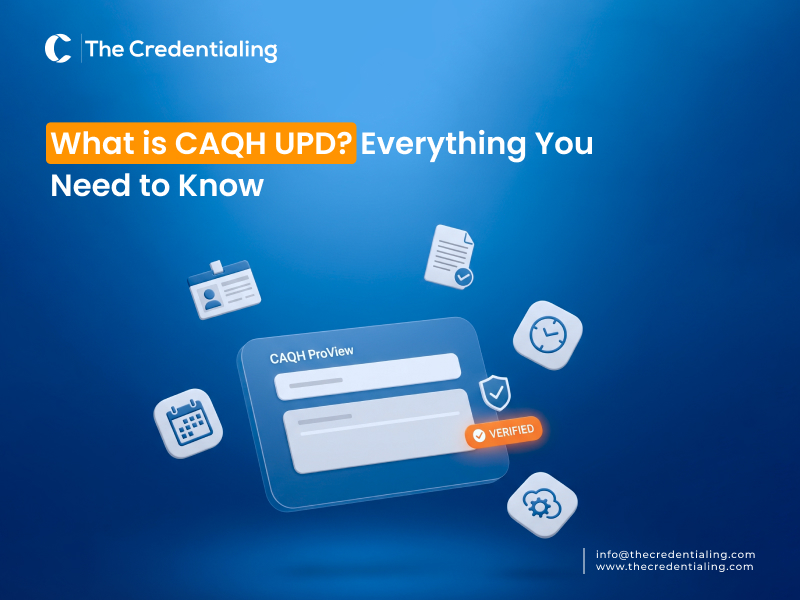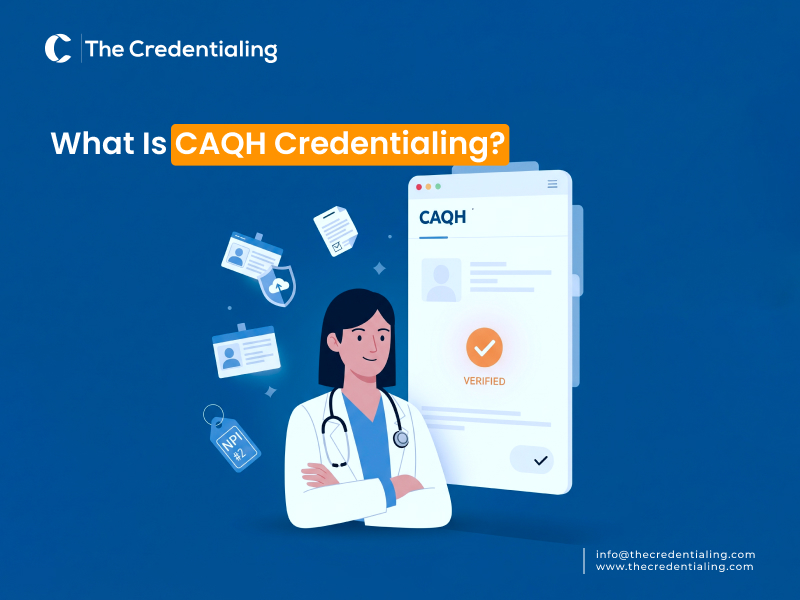Time Required for Physician Credentialing
Find out how long physician credentialing takes in the U.S., key factors affecting timelines, and tips to speed up the process for faster approvals.
Schedule Free Demo Today
Physician credentialing ensures a formal verification of the healthcare provider’s credentials, including the provider's education, training, licenses, previous work history and required skills to meet the compliance standards set by the regulatory bodies.
Considering the process steps and complexity, such as payer coordination, following the updated guidelines is one of the factors that make the job frustrating for professionals. Hence, neglecting the comprehensive understanding of key aspects of the process may result in frequent delays, particularly when the credentialing timeline is crucial.
On average, the standard time to credential a provider initially spans 90-150 days. However, some optimal cases (staff efficiency and complete documentation) may take 45 to 60 days only while at the same time, there are complicated credentialing conditions that may go beyond 180 days, depending on the setting and other factors.
This comprehensive guide explores the key factors that impact the time required for physician credentialing. Gaining clarity on the typical timeline for insurance credentialing and the elements that cause delays can lead to smoother credentialing, fewer revenue disruptions, and a more accurate, error-free workflow. So, without further delay, let’s walk you through the complete timeline and essential details of the insurance credentialing process.
The Time Required for Physician Credentialing Reddit: What Causes the Delays?
The average time it takes to verify and credential a healthcare provider varies from one setting to another, and so for the credentialing process. For instance, the complete credentialing timeline takes 90-150 days. Under optimal conditions, the minimum time required for credentialing is 45-60 days. An extended time is allowed for complicated conditions, which can reach up to 180 days.
There is a change in the process timeline due to the nature of the process and the associated entity. The recent industry data from Alpha Core Healthcare shows that the standard timeline spans 2 to 6 months, while Reddit Contributors commonly report 60-90 days for credentialing at hospitals, yet some ideal scenarios vary. Here’s a simple breakdown:
How long does credentialing take for a physician?
-
Credentialing by hospitals: (60-120 days)
-
Credentialing by insurance companies: (90-120 days)
-
Credentialing by Medicare: (60-90 days)
-
Credentialing by Medicaid: (45-90 days)
Nature of Credentialing Process (Initial Vs Recredentialing)
-
Initial Credentialing: (90-150 days)
-
Re-Credentialing: (60-90 days), the fastest period due to established relationships
Some of the reported credentialing bottlenecks
One of the significant reasons for physicians and providers to face delays in credentialing is due to the late state licensing processes, especially impacting the performance of new providers joining the network. Such unforeseen delays make it difficult for organizations to schedule provider dates while facing issues in patient care.
Another reason is the varying state licensing process despite the similar licensing requirements across the country. Such state-based license requirements for physicians performing care in multiple hospitals need separate credentialing and privileging for each hospital, delaying the overall process. State license aside, there are issues with the licensing speed and professionalism across states, while staff shortage also creates hurdles in the process flow.
Some states employ independent medical boards for license approval, while others house their boards within a larger agency. Moreover, many states still utilise manual methods for provider licensure, such as requiring applicants to submit the data via mail or fax.
Delays in credentialing aren’t just the result of external factors but also internal factors such as the extensive paperwork that every provider starting a new practice or working in a healthcare organization must understand. There are many process steps requiring key attention while focusing on the varying payor requirements to meet the standards of timely credentialing and enrollment.
Crediting Timelines by Different Scenarios & Payer Types
Physician credentialing timelines have different scenarios, as the process duration is impacted due to many factors. The examples include the facility type, the complexity of the provider’s credentials, state-specific licensing and payor requirements and the efficiency of the credentialing process within the organisation. Below is the list of some major scenarios along with the required timeline and factors affecting that duration:
|
Potential Scenarios |
Required Timeline |
Factors Affecting |
|
Hospitals & Health Systems |
30-90 days & can be extended |
Extensive hospital credentialing, due to operational complexity and strict verification |
|
Managed Care Organizations (MCOs) |
60-120 days |
MCO-specific requirements impacting credentialing timelines |
|
Ambulatory Surgery Centres (ASCs) |
30 to 60 days |
Streamlined ASC credentialing for faster turnaround |
|
Telemedicine Practitioners |
15 to 45 days |
Accelerated credentialing due to telemedicine flexibility |
|
Locum Tenens Practitioners |
1 to 4 weeks |
Expedited credentialing for locum tenens roles |
|
New Providers |
30 to 90 days |
Extended timelines for first-time provider credentialing |
|
Re-Credentialing |
Varied, often around two years |
Re-credentialing is impacted by data completeness and verification delays |
Credentialing Timeline by conditions, the Payor Type:
Already licensed providers:
-
60-90 days, depending on the documentation readiness and payer responsiveness.
-
An updated CAQH profile and prior enrollment can accelerate the process.
Nurse Practitioners (NPs):
-
May range from 90-120 days
-
Timelines vary based on speciality, independent billing, and collaborative agreements with the physicians.
Blue Cross Blue Shield (BCBS):
-
Credentialing with BCBS may take 90 to 120 days
-
Delays are common when provider data is missing or outdated during submission
Medicare (Via PECOS):
-
For providers wanting to know “how long does it take to get credentialing with Medicare”, it requires 30-60 days, excluding the initial CAQH provider profile setup
-
The timeline may be extended if the MACs (Medicare Administrators Contractors) experience volume spikes
California Credentialing:
-
The time required for physician credentialing in California is 120-150 days due to additional regulatory and payer-specific requirements.
-
Large provider groups and hospital systems may also add internal approval that extends the timeline.
Can CAQH Speed Up Physician Credentialing?
CAQH (Council for Affordable Quality Healthcare) is a centralized digital system that eases the physician credentialing process by offering providers access to update their information. Instead of submitting their data separately to each provider, physicians can share their credentials, including the license, qualification, training, and other data once, and it is submitted to multiple insurance payers for further proceedings, including reimbursement for the services.
Delays are due if the provider's credentialing information is outdated or missing significant details. Here’s how CAQH ProView speeds up the process:
-
Providers’ data is centralized for easy access by multiple authoritative healthcare bodies.
-
CAQH ProView helps providers set reminders for license renewals, certifications, and other key details to stay updated and compliant.
-
Data consolidation and streamlining the information-sharing process help physicians join new networks or initiate practice earlier.
-
CAQH utilization enhances overall process efficiency in healthcare by reducing administrative burdens while giving way to providers for improving patient care.
-
Moreover, using credentialing helps the provider portal in reducing the risk of errors or omissions.
When does credentialing occur? Quizlet in Healthcare & the Common Challenges
Commonly, credentialing is a three-step process that verifies a physician’s credentials at the first interval, the second step is “privileging”, which permits them to perform specific services at the institutions based on their performance, and later comes the “enrollment”. This is a type of provider contracting with the insurance payers, such as Medicare, Medicaid, and commercial insurance, for billing and reimbursement of the services offered.
The process has several trigger points, including the need when a new provider is hired when the provider seeks to join a new insurance network, and the cycle of re-credentialing that occurs after 2-3 years. The Quizlet-style learning resource highlights that credentialing is a prerequisite for physicians for billing, especially when providing services under a specific facility or organisation.
However, many of the issues that hinder the credentialing speed and progress while disrupting the revenue stream in healthcare such as the data collection of the required documents, malpractice insurance, and board certifications. More frustrating is the repetition of the same data submission with separate payers, which causes process delays and so approvals.
Reference verification is another hurdle, especially when these are slow to respond can also impact the speed of the process. Varying insurance providers’ guidelines and compliance requirements, especially by the larger organizations, also cause barriers. Hence, without the use of modernized credentialing systems in place, the credentialing timeline or the duration may easily be extended around 90-120 days, not only causing delays but also restricting the enhancement of the patient base.
CAQH & AMA: The active and passive roles:
Moreover, prevention of such regular slowdowns is possible with a centralised system that works efficiently, like CAQH. These digital platforms have features that allow performance as a “single source of truth”. By pulling the necessary provider data from multiple nationally recognised sources such as medical schools, previous employers, licensing boards and so on, this system leaves no room for constant, repetitive verifications and lengthy paperwork.
Yet, healthcare providers must ensure initiating the process soon while maintaining their CAQH profile with updated data that will eliminate the many risks and improve the overall process efficiency and revenue flow.
Although the CAQH credentialing has a direct impact on the process speed and timeline, the AMA (American Medical Association) impacts passively on the process speed passively. Healthcare providers must ensure that they fulfil all the aspects of the AMA Physician Profile accurately for the institution where they are going to seek employment, as they can access these platforms to verify physician credentials.
Though the AMA also contains the information obtained from the primary data sources to expedite the verification, this platform varies from the CAQH in that it is maintained by the AMA itself without provider access. Hence, it is utmost to leave no gaps in data updation. These are the crucial documents to submit along with the supporting files:
-
Education, training, board eligibility, and certification.
-
Federal, state, and professional licenses and registration.
-
Explanation of any gaps of 30 days in education, training or work history.
-
Physician work, medical staff, and clinician privilege history.
-
Names and emails of peers who can offer references.
-
Clinical report cards and performance reviews.
-
Medical liability insurance carriers and any claim history.
Some of the Top Picks for Credentialing & File Management
-
Ensure strict access controls to restrict unauthorised access to your data.
-
Maintain a comprehensive physician credentialing checklist to track all requirements and deadlines.
-
Complete CAQH attestation every 120 days and set reminders for scheduled renewals.
-
If you are concerned about how long to keep physician credentialing files securely, there is a crucial period of 7–10 years, as recommended by CMS and most payers.
-
Regularly update licenses, insurance, and certifications to prevent processing delays.
Conduct regular audits of access logs and document permissions to identify security issues. -
A detailed audit trail may help in tracking who changed the documents.
-
Ensure MFA (multi-factor authentication for secure access to the sensitive credentialing data.
-
Use digital tools or credentialing software for organized file management and audit readiness.
Outsource Physician Credentialing with TheCredentialing for Reducing Timelines!
Reducing delays in physician credentialing starts with preparation. Ensure all documents are gathered early, CAQH profiles are current, and attestation is maintained every 120 days. Understanding each payer’s specific requirements helps avoid avoidable setbacks. A proactive checklist and clear credentialing timeline not only streamline onboarding and regulatory compliance but also protect revenue flow and staffing plans
By aligning expectations with credentialing realities, healthcare organizations and providers can better manage hiring processes, reduce disruptions in reimbursement, and stay ahead of compliance issues. Timely credentialing isn’t just a formality—it’s a vital part of efficient, financially sound healthcare operations.
TheCredentialing is a professional provider credentialing process with lasting effectiveness. Explore “TheCredentialing digital portal” and learn how to efficiently handle your credentialing application while offering prime data security and access to speed up the process for fair reimbursement and practice revenue stream.
Frequently Asked Questions (FAQs):
How long does it take to credential a provider who is already licensed in a state?
Typically, 60–90 days. While being licensed speeds up the process, delays can still occur due to paperwork, verification, and payer timelines.
How long does it take to get credentialed with Blue Cross Blue Shield?
Credentialing with BCBS usually takes between 90–120 days. The timeline varies by state plan and the completeness of submitted documents.
How long does credentialing take for an NP (Nurse Practitioner)?
On average, 60–120 days. Credentialing for NPs follows a similar process to physicians, though specific requirements may differ by state or employer.
Sit Back and Relax! Let The Pros Handle Credentialing For You!
thecredentialing has built a strong portfolio while providing credentialing services to clients over the years. Our service includes helpful features that you won’t find anywhere else.
Schedule Free Demo Today!

